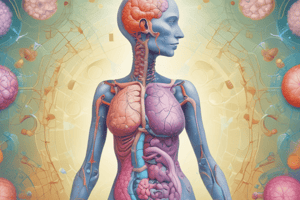Podcast
Questions and Answers
What region of the brain controls the regulation of hunger?
What region of the brain controls the regulation of hunger?
hypothalamus
Which hormone released by the stomach stimulates appetite?
Which hormone released by the stomach stimulates appetite?
ghrelin
What is the role of leptin in hunger regulation?
What is the role of leptin in hunger regulation?
suppresses appetite
What is the function of neuropeptide Y (NPY) in central signaling pathways?
What is the function of neuropeptide Y (NPY) in central signaling pathways?
What is the role of gastric distension in short-term regulation of hunger?
What is the role of gastric distension in short-term regulation of hunger?
What region of the brain controls the regulation of thirst?
What region of the brain controls the regulation of thirst?
What is the function of osmoreceptors in the regulation of thirst?
What is the function of osmoreceptors in the regulation of thirst?
What is the role of angiotensin II in the regulation of thirst?
What is the role of angiotensin II in the regulation of thirst?
What is the role of vasopressin (ADH) in central signaling pathways?
What is the role of vasopressin (ADH) in central signaling pathways?
What is the effect of decreased blood volume on thirst?
What is the effect of decreased blood volume on thirst?
Flashcards are hidden until you start studying
Study Notes
Hunger
- Regulation of Hunger:
- Controlled by the hypothalamus, a region in the diencephalon
- Involves a complex interplay of hormonal and neural signals
- Hormonal Regulation:
- Ghrelin: released by the stomach, stimulates appetite
- Leptin: released by adipose tissue, suppresses appetite
- Insulin: released by the pancreas, suppresses appetite
- Central Signaling Pathways:
- Neuropeptide Y (NPY): stimulates appetite
- Agouti-related peptide (AgRP): stimulates appetite
- α-Melanocyte-stimulating hormone (α-MSH): suppresses appetite
- Short-term Regulation:
- Gastric Distension: stretching of the stomach wall signals satiety
- Cholecystokinin (CCK): released by the duodenum, signals satiety
- Glucagon-like peptide-1 (GLP-1): released by the ileum, signals satiety
Thirst
- Regulation of Thirst:
- Controlled by the hypothalamus, specifically the lamina terminalis
- Involves a complex interplay of hormonal and neural signals
- Osmoreceptors:
- Osmoreceptors in the hypothalamus: detect changes in blood osmolality
- Baroreceptors in the aortic arch and carotid sinus: detect changes in blood volume
- Hormonal Regulation:
- Angiotensin II: stimulates thirst
- Atrial natriuretic peptide (ANP): suppresses thirst
- Central Signaling Pathways:
- Dopamine: involved in the regulation of thirst
- ** Vasopressin (ADH)**: released by the hypothalamus, stimulates thirst
- Short-term Regulation:
- Dryness of the mucous membranes: stimulates thirst
- Decreased blood volume: stimulates thirst
Studying That Suits You
Use AI to generate personalized quizzes and flashcards to suit your learning preferences.




